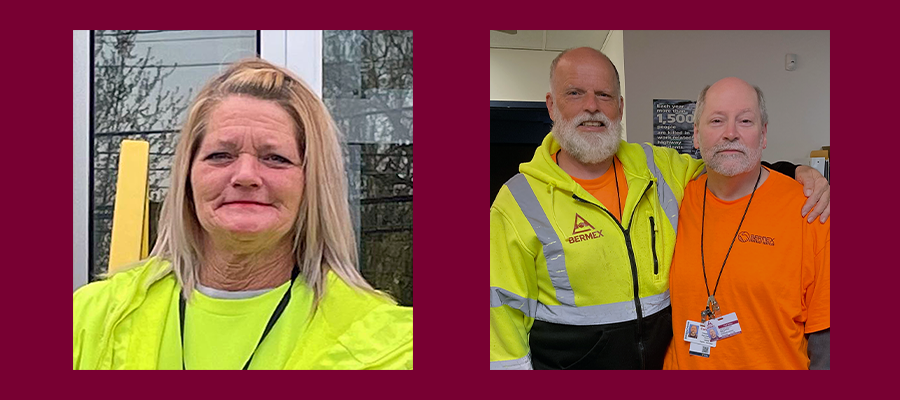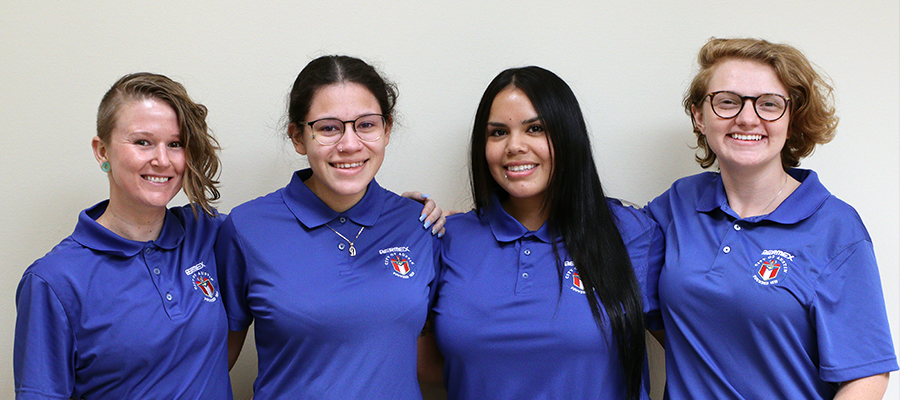Get to Know a Few of Bermex’s Long-Time Employees from Columbus, Ohio

Get to Know a Few of Bermex’s Long-Time Employees from Columbus, Ohio
As part of our celebration of the 50th anniversary of the conception of Bermex we are talking with some of our most tenured employees.
• Kimberly “Kim” Triplett, (’96) lead meter reader
• Paul Melton, (‘98) meter reader
• James “Jim” Oldham, (‘96) meter reader
Tell us about your Bermex beginnings.
KT: I think it was 97 degrees the day I started. I was making $7/hour. The girls who trained me told me to make sure I bring plenty of Lifesavers because if you drink too many liquids, you’ll want to use the bathroom all day long. Believe me, I stocked up on Lifesavers for a long time.
PM: I came here because my wife wanted me out of the house. This was supposed to be a throw away job, just long enough to until my mother in-law passed – that’s why we were in Columbus. I just needed to find something to do and keep me busy. It’s been 20-some years and I’m still here. It became a source of pride. I didn’t want to see the next generation coming through to not have somebody to show them the way like there was when we started. I wanted to keep that foundation going through.
JO: I didn’t even buy rain gear when I started because I wasn’t going to be here long enough. It took me like seven years to finally buy it because I kept telling myself, no use in getting it because it won’t be staying. 20-some years later and I’m still here, too.
What were your early days at Bermex like?
PM: Jim and I started back when we were both walking routes. We were young, thin, and had hair. We both started under our old district manager, Frank Iannotti — Frankie the Fist. We really loved coming into work, it felt like a family. We had a lot of fun together, but we still got the work done, which was ingrained in us, to always to the right thing.
JO: Frank ran the office like he owned the business. We weren’t owners then, but it felt like it because of him. He ingrained in us that everything you do affects someone else, that’s why everybody had to pull their weight because if you didn’t, someone else had to make up for it. In everything Frank did, he would instill leadership in every person who worked for him. The people who didn’t buy-in didn’t last very long. We’ve probably seen 500 people come and go the years. But boy, the people who lasted – they’re employees who you’d want.
KT: I’ve always loved this job. I went from a school cook to a meter reader. I came in and interviewed, then didn’t hear from the manager, so I called and bugged him until he gave me a chance. He said “Trippy, I never would have chosen you if you hadn’t bugged me like you did. I didn’t think a person coming from a school cook – your hair was always neat, always had lipstick on – I never thought you’d be fit for this job.”
What does it take to be successful at this job?
PM: Back then, a lot of people didn’t realize when we told them be prepared to walk 10 miles a day, we were serious. A lot of the time, it depended on if you were trained well out in the field at the beginning. If you had a good person train you, it really made a difference. It’s one thing learning the job from people in the office and textbooks, but then getting out in the field with somebody who’s done the work and they can impart their wisdom, that really made a difference.
JO: The physical part of the job is big. You find out pretty quick whether you can handle it or not. It’s just as hard mentally too. It’s hard to wrap your mind around, when walking in the door, whether it’s 100 degrees that day, pouring down rain, or snowing like a blizzard – you’re going to walk all day in those conditions. Everyone wants to be a meter reader when the weather is beautiful, sunny and 70 degrees.
KT: People think all you have to do is walk? That’s easy enough. They don’t understand that you’re on a time schedule. You can’t go out there and leisure. If it’s sunny out, you can’t go to the park for an hour then come back. You have a job to do, and you have to do it in a timely manner. You have to keep going and you can’t stop.
What was it like dealing with customers every day?
PM: Customer service was big. Especially if you did that route all the time. You know you’ll back there next month. You really had to interact with customers. It got to the point where I got to know certain individuals and families on my routes. There were certain older people who I was the only person they’d talk to all day. They would stop me in the mornings, so I’d try to build in extra time on my route that day because I knew they’d want to talk and offer me a cup of coffee.
JO: I did the same thing. I had customers like that who I saved their house for last because I knew I was the only one they ever talked to. That way I knew my work was done, I could take my time and wasn’t sitting there looking at my watch. I could sit there, have a cup of coffee, and spend some time with them. You got to know your customers very well and they liked you. It became a friendship.
How many miles do you put on a day?
PM: Every day, my driving routes are over 200 miles.
KT: I used to walk 10-12 miles a day, if not more. Everything was in basements then. We were walking up steps to get to the house, through the house, back down steps to get to the basement, read the meter, back up the steps, down the porch steps, and on your way you went. It’s a lot of steps.
JO: I have maybe a couple driving routes a month, but I walk all day, every day. I was given the choice when we got the radio reads and I chose to continue to walk. Still to this day, I don’t regret it.
What advice do you offer to help new employees stick it out?
KT: We all know how to read dials – they’re all digital numbers. There’s really nothing to learn, except to get out there and enjoy what you do. Keep your mind on what you’re doing, enjoy what you’re doing, and pick up the pace each time you get out there.
JO: I had an employee I trained, and he was here for 25-some years. He wasn’t comfortable if he didn’t know everything, so I told him from day one to go home and forget everything I just showed him because he’d see it again tomorrow. When you do the same thing day after day, you pick it up. Houses don’t move – learning the equipment is the most important thing.
PM: I used to be the trainer here in Columbus and I’ve trained a gazillion people in the office and field. I always tell them to ask questions – no question is a dumb question. If you make a mistake, take it in, learn from it, and grow from it. Nobody’s perfect. Every day is a new day. Yes, we do the same thing every day, but every day is different because you don’t know what you’re going to encounter when you go out and jump in your vehicle. That’s why it’s very important to take the information from our trainings and safety classes because you never know when you’ll find yourself in a situation where you’ll need one of those nuggets.
Tell us about a memorable experience from your time at Bermex.
JO: I ran through a high school one time because they had a 20-foot fire coming out of their dumpster. I had to run halfway through the school to report it to someone. I didn’t leave the property until I heard the firetrucks coming.
KT: People used to go in and out of buildings, especially the homeless. Everything’s so shut down now, they don’t allow people to do that anymore. I remember walking into one of those old buildings downtown one morning and it was darker than it should be. My flashlight was just starting to lose its battery life, so I didn’t have much light. I’m telling you, I heard something behind me. You know how you can tell if there’s something or somebody there? You talk about scaring the living daylights out of me, I could barely see but a body lying on the ground all covered up. When they heard me start punching numbers in my handheld, I think it scared them as much as it scared me. Turns out, it was a homeless person laying there covered up with a blanket. I ran out of that place and thought, “Oh my gosh, do I really want to do this?”
PM: Back in the day, we used to wear gray button-up shirts with two pockets. Above one it said Bermex and the other your name. I had cards we hung on the door if nobody was home and I always carried them in my pocket which covered my name. This old lady thought that my name was Bermex. She wasn’t quite all there, and I never had the heart to tell her that Bermex wasn’t my name. She used to call me from down the street, “Here comes Bermex!”
Related Articles

By Tommy Combs, President, Bermex In the latest edition of the DIRT Report, the Common Ground Alliance (CGA) reveals that despite decades of progress in underground infrastructure damage prevention, the industry remains at a critical turning point. The 2024 data show a concerning plateau, and in some cases a reversal, in the trend of reducing[...]
Read More
Bermex was founded by two like-minded individuals with a passion for helping people. Since 1972, we’ve been working towards providing the best solutions by reducing our clients’ costs and minimizing customer complaints. We work with gas, electric, and water utility companies to design a plan that best fits the challenges our customers face. As Bermex[...]
Read More
Veterans Day is a time for us to pay our respects to those who have served. For one day, we stand united in respect for you, our veterans. The military men and women who serve and protect the United States come from all walks of life; they are parents, children, grandparents, friends, neighbors, and coworkers,[...]
Read More
Over the last year and a half, the Bermex team in Austin, Texas has experienced its fair share of change. Under the leadership of Operations Manager Phillip Hollis, their current project has been renewed and he credits a team of four women with just the right experience to help lead the charge. Before transitioning to[...]
Read MoreCategories
Recent Posts
- Diffusing a Difficult Customer [Infographic] 10th Sep 2018
- Neighborhood Safety [Infographic] 24th Sep 2018
- Bermex Has Named Keith Pancake as New Safety Manager 02th Dec 2019